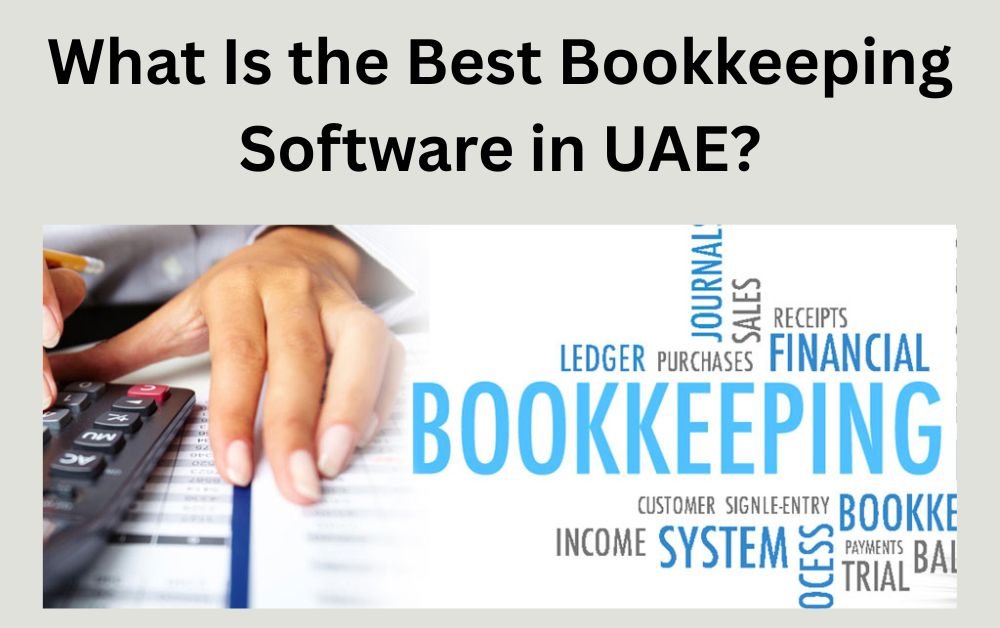Bookkeeping is the backbone of any business’s financial health, and in the rapidly growing economic environment of the United Arab Emirates (UAE), accurate financial tracking has become more essential than ever. From start-ups in Dubai’s bustling tech sector to traditional trading companies in Sharjah, businesses need reliable, user-friendly, and efficient bookkeeping software to manage their financial data. The UAE’s unique tax laws, including VAT regulations introduced in 2018, further underscore the importance of using the right accounting tools. This article explores the best bookkeeping software available in the UAE, evaluating them based on features, usability, compliance, and pricing.
Note: The challenges of managing accounts were simplified using Bookkeeping Software in UAE. Financial accuracy was improved, and compliance was ensured effortlessly. Businesses across the region were empowered to save time and resources.
Importance of Bookkeeping Software in the UAE

With the implementation of VAT and other regulatory changes, businesses in the UAE are required to maintain accurate financial records. Manual bookkeeping is not only time-consuming but also prone to errors. Software solutions help automate repetitive tasks, generate reports, and ensure compliance with local laws.
The right software can provide a comprehensive view of a business’s financial health, facilitate better decision-making, and help avoid costly penalties for non-compliance. Moreover, cloud-based solutions offer real-time access and collaboration, which is critical for companies with multiple branches or remote teams.
Key Features to Look for in Bookkeeping Software
When selecting bookkeeping software for use in the UAE, several key features should be considered:
- VAT Compliance: The software must support VAT calculations, filing, and reporting in accordance with UAE Federal Tax Authority (FTA) requirements.
- Ease of Use: An intuitive interface is essential, especially for businesses that do not have a full-time accountant.
- Integration Capabilities: The software should integrate with other business tools like payroll systems, CRM software, and e-commerce platforms.
- Multi-Currency Support: Given the UAE’s international trade landscape, support for multiple currencies is highly beneficial.
- Cloud Accessibility: Allows for remote access and better data security.
- Customer Support: Local customer support can be a game-changer in resolving issues quickly.
Top Bookkeeping Software Options in the UAE
Below is a review of the most popular bookkeeping software solutions used in the UAE, based on the criteria mentioned above.
Zoho Books
Zoho Books is one of the most widely used accounting platforms in the UAE and is fully compliant with FTA regulations. It caters well to SMEs and offers a wide range of features.
Features:
- VAT-compliant invoicing and reporting
- Automated workflows
- Client portal for easy collaboration
- Time tracking and project management tools
- Mobile app availability
Pros:
- Affordable pricing
- Easy to use
- Strong local support in the UAE
Cons:
- Limited features in lower-tier plans
- May not be suitable for very large enterprises
QuickBooks Online
QuickBooks is a global leader in accounting software and has a significant presence in the UAE. The online version is particularly popular among small and medium businesses.
Features:
- VAT configuration and compliance tools
- Real-time dashboards
- Bank reconciliation
- Inventory management
Pros:
- Robust ecosystem of add-ons
- User-friendly interface
- Extensive learning resources
Cons:
- Pricing can be high for advanced features
- Limited local customization compared to regional providers
TallyPrime
Tally has long been favored by businesses in the UAE for its comprehensive accounting and inventory management features.
Features:
- Complete business management solution
- UAE VAT compliant
- Detailed financial reporting
- Payroll and HR modules
Pros:
- Highly customizable
- One-time purchase option available
- Strong legacy in the market
Cons:
- Steeper learning curve
- Mostly desktop-based, with limited cloud features
Xero
Xero is another cloud-based accounting platform that has gained traction in the UAE. It is especially favored by tech-savvy businesses and startups.
Features:
- VAT support and automation
- Integration with over 800 business apps
- Multi-currency and multi-language support
- Real-time financial reporting
Pros:
- Excellent UI/UX
- Strong community support
- Cloud-first approach
Cons:
- Slightly more expensive than other options
- May require customization for local needs
Sage 50 (formerly Peachtree)
Sage 50 is popular among mid-sized enterprises in the UAE. It offers robust functionality and industry-specific solutions.
Features:
- UAE VAT compliant
- Payroll integration
- Comprehensive audit trail features
- Inventory and supplier management
Pros:
- Suitable for growing businesses
- Secure and reliable
Cons:
- Can be complex for beginners
- Interface feels dated
Wave Accounting
For freelancers and very small businesses, Wave offers a free solution that covers the basics of bookkeeping.
Features:
- Free invoicing and expense tracking
- Basic VAT functionalities
- Customizable invoice templates
Pros:
- Completely free to use
- Intuitive and simple
Cons:
- Limited features
- No local support
Factors to Consider Before Making a Decision
Choosing the right bookkeeping software depends largely on the size of the business, industry requirements, and budget. Here are some additional factors to consider:
- Scalability: Can the software grow with your business?
- Security: Does it offer secure data storage and backups?
- Training and Support: Are training materials and customer support readily available?
- User Permissions: Can you assign different access levels to your team?
Final Thoughts
Bookkeeping software is a critical tool for maintaining financial clarity and compliance in the UAE. Whether you are a freelancer, a small business owner, or managing a mid-sized enterprise, there are multiple solutions tailored to your needs.
Zoho Books and QuickBooks Online emerge as top choices for SMEs due to their user-friendliness and comprehensive features. TallyPrime and Sage 50 suit businesses looking for robust, customizable solutions, while Xero is ideal for those who prioritize cloud accessibility and app integrations. Wave remains a go-to for startups and freelancers with minimal bookkeeping needs.
Ultimately, the best bookkeeping software is one that not only meets regulatory requirements but also enhances efficiency, provides insightful reporting, and scales with your business. Conducting a thorough assessment of your business requirements and trialing a few platforms can lead you to the best decision for your financial management in the UAE.
For more insightful articles related to this topic, feel free to visit: techners.net












Leave a Reply